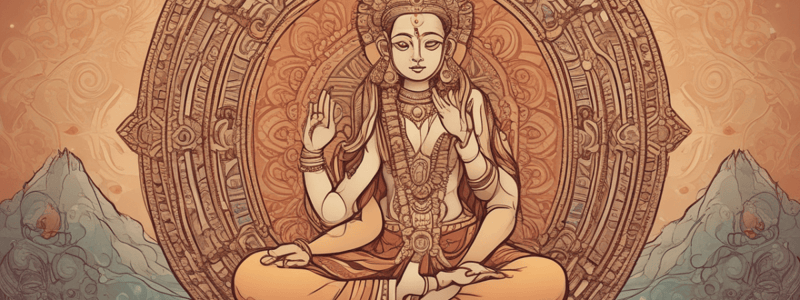Podcast
Questions and Answers
What is the purpose of yoga in Hinduism?
What is the purpose of yoga in Hinduism?
- To exercise the body
- To sacrifice foods to deities
- To bring about full mindfulness and connect to Brahman (correct)
- To perform communal worship services
What is the term for communal worship services in Hinduism?
What is the term for communal worship services in Hinduism?
- Yoga
- Puja (correct)
- Sadhana
- Bhakti
What does the term 'sadhana' literally mean?
What does the term 'sadhana' literally mean?
- Spiritual practice
- Realization (correct)
- Unite
- Meditation
What is the focus of sadhana in Hinduism?
What is the focus of sadhana in Hinduism?
What is the meaning of the term 'yoga' in Hinduism?
What is the meaning of the term 'yoga' in Hinduism?
What is involved in Hindu meditation practices?
What is involved in Hindu meditation practices?
What is the purpose of tantras in sadhana?
What is the purpose of tantras in sadhana?
What is practiced around the world in the 21st century?
What is practiced around the world in the 21st century?
What is the goal of Hindu yoga?
What is the goal of Hindu yoga?
What is included in Hindu puja services?
What is included in Hindu puja services?
Flashcards are hidden until you start studying
Study Notes
Characteristics of Hinduism
- Hinduism is one of the oldest religions still practiced today, and it is the oldest religion that is still practiced today.
- The tradition combines beliefs, cultural practices, and philosophy of ancient and modern India.
- Hinduism is famous for having thousands of deities, both gods and goddesses, but most Hindus believe that all of the deities are manifestations of Brahman.
Origin of Hinduism
- There is no singular founder of Hinduism, making its origins and early history unclear.
- Some scholars believe that Hinduism originated in the Indus Valley region around 10,000 BCE.
- The term "Hindu" was given to the tradition by the Persians who inhabited the area much later.
Scriptures
- Hinduism has a variety of texts that are authoritative for the tradition, including the shruti and smriti.
- The shruti contains many sacred scriptures that monks and other religious leaders have preserved and studied over time, all of which are contained in the Vedas.
- The smriti contains popular religious literature, including the epics the Mahabharata and the Ramayana.
Vedas
- The Vedas are the oldest texts of Hinduism and contain knowledge that always existed in the world but was finally written down.
- The Vedas provide Hindu commentary on the earlier Vedas and contain the philosophical discourse of the tradition.
- The Brahmanas are a subset of the Vedas that provide Hindu commentary on the earlier Vedas.
- The Upanishads are the latest written texts in the Vedas and contain the philosophical discourse of the tradition.
Smriti
- The smriti contains two epics, the Ramayana and the Mahabharata, which tell two of the most important stories in Hinduism.
- The Ramayana tells the story of Prince Rama, an incarnation of the god Vishnu, killing the demon king Ravana to rescue his wife, Sita.
- The Mahabharata is the longest recorded poem in the world and describes a war that takes place between families in India.
Major Beliefs of Hinduism
- Dharma, or duty, is based on one's position in life and is determined by their actions in a previous life.
- Samsara is the cycle of reincarnation, and moksha is the escape or liberation from the endless cycle of birth and rebirth.
- Karma is the concept of right action and is inherently tied to the other concepts of Hinduism.
- Ahimsa, or non-violence, is part of one's dharma for most people.
Deities
- Brahman is the supreme god or spiritual entity who has various incarnations, including the trimurti (Brahma, Vishnu, and Shiva).
- Brahma is the creator god, Vishnu is the restorer or preserver god, and Shiva is the destroyer god.
- Shakti or Devi is the supreme goddess who is worshiped in various incarnations and is as powerful and important as Vishnu and Shiva.
Institutions
- Temples, or mandir, are the primary places of worship for Hindus and are usually dedicated to a specific deity.
- Ashram are Hindu monasteries used primarily for Hindu spiritual leaders to retreat for meditation, instruction, and religious reflection.
Practices
- Bhakti, or devotion to the deities, is one of the most common practices of Hinduism.
- Puja is a communal worship service that involves prayer, bhakti, a sacrifice of foods to the deities, music, and meditation.
- Yoga and sadhana are spiritual practices used to bring about full mindfulness and connect to Brahman.
Studying That Suits You
Use AI to generate personalized quizzes and flashcards to suit your learning preferences.





